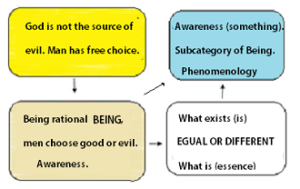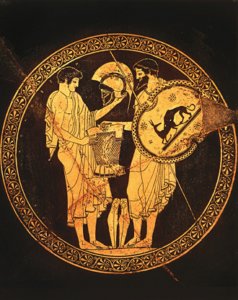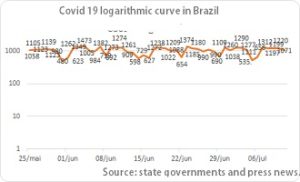
Arquivo para a ‘Information Science’ Categoria
The goodness and the power
The goodness is that which is a common good, it is practically irreconcilable  with the temporal power, the one that submits the other by force, in whatever way this submission, collective practices of imposing values, subtle ways of making exclusion and especially the exercise of force gross.
with the temporal power, the one that submits the other by force, in whatever way this submission, collective practices of imposing values, subtle ways of making exclusion and especially the exercise of force gross.
A definition by Max Weber is worth: “how each chance to impose, within a social relationship, one’s own will even against reluctance, no matter what that chance is based on” (Weber, 1922) is in the first chapter of the book “Economics and Society ”whose German edition is from 1922, another interesting definition is that of Hanna Arendt:“ Conceptually speaking, this means: Power is, in fact, essential to all states, including all types of organized groups, whereas violence is not ”in his 1960 book which is about “Active Life”, but which in the translation into Portuguese and English became“ The human condition ”.
If it is possible for the common good to be established, accepting the condition of Hanna Arendt, it will not be through violence, but through nonviolent power, and a brief look at history can see the consequences of violence as a form of power, almost always new forms of exclusion and submission of some parts of the population, as unanimity is impossible, it is necessary to live with difference, this is the formula that precedes any good worthy of the name and sustainable.
The resurgence of nationalism, ideological polarization, and especially the return to forms of violence that seemed to be gradually banished from society, show the crisis of humanism, which did not start today, but at the beginning of the last century and witnessed two wars.
To imagine that some common good can be established by force is therefore contradictory with what legitimizes some form of reasonable power and capable of influencing the conscious portion of society, every other form is destructive and can hardly be sustained, but the limits of force are today scary: the nuclear possibilities and the use of “smart” machines.
Betting on confrontation and conflict proved to be in the past of two wars and several colonial wars disastrous and unsustainable, and in the near future the one that brought the most violent and truculent leaders to power.
In times of pandemic, and with a visible future for a vaccine, one could think of total disarmament and who knows with the billions spent on wars we would have funds to reactivate economies and the dangers of a dark future could be removed.
The lessons on nonviolence and solidarity have not yet been learned, even in the common struggle against the pandemic, although there is always hope for such clear and definite warnings
Evil and humanism in crisis
Idealism continues to defend its ideology of State, of Ethics (morals and virtues are other things, for example, ending corruption), now defending nations, a stronger State (left and right in the bottom want this) and for this reason one can speak of the zoon politikon, Aristotle’s political animal, then it is necessary to understand what the political animal is.
are other things, for example, ending corruption), now defending nations, a stronger State (left and right in the bottom want this) and for this reason one can speak of the zoon politikon, Aristotle’s political animal, then it is necessary to understand what the political animal is.
There are two conditions that may not become political: being degressed (we would say excluded today) or being superhuman (or divine, thus of a higher order than human laws and rules).
This is the first premise to understand “Rules for the Human Park – a response to Heidegger’s Letter on Humanism”, it is not, therefore, about seeing man as a “bug” in the zoo, but as a “natural” animal but that his humanism is in check.
The controversy that followed his speech at the castle of Elmau in Bavaria meant that the attempt (from the schools of Plato and Aristotle) to program history and humanism through social engineering failed, another important issue is the “domestication” issue.
Domestication is also not new, the philosopher received a direct influence from Nietzsche, and Foucault also addressed the topic, his proposal at the Conference that later became a book, was to reverse Heidegger’s priority of the ontological dimension over ontics (Sloterdijk, 1999,).
The controversial cause is because the philosopher wondered if we would not pass from the fatality “from birth to chosen birth and prenatal selection” (Sloterdijk, 2000) which was the main point of the controversy trying to show this the Nazi and fascist ideas of the war period .
The issues of genetic manipulation, which in Germany suffered strict restrictions until 2002 and the leadership of the Frankfurt School by Haberrmas were the background of this controversy, but what is fundamental is the humanism of Heidegger and Levinas, the theme of the Elmau conference is a main aspect, forgotten by many commentators, because humanism is really in crisis.
As for Sloterdijk’s response, he himself returns to the theme of in Spheres I differently when speaking of an aortic manifestation, the inorganic over the organic, after all, man came from Earth even by the biblical metaphor, so from the inorganic clay God “blew” the nostrils and introduced the spirit, like it or not, the theme is metaphysical and not religious, and if something aortic happens.
Time will not be the first time in history, man came after the heavens, the earth and the waters, again also in the various cosmogonies (even non-Christian) and the earth itself has already had other manifestations, such as the one that eliminated the dinosaurs, because a new one cannot occur, and it helps us to face the period (or civilization) crisis that we face.
The weather is different from ours; the comet returns after 6,800 years to visit us, we didn’t even have a record of it, and when it returns after another 6,800 years what it finds, only God knows, now is neowise (see the picture).
Civilizing evil, beyond the symbolic
We have already commented in a post on “Symbolic Evil”, a work by Paul Ricoeur that should be read together with “Evil: a challenge to philosophy and theology and“, symbolic evil exists and can become structural, but in a good reading of philosophy means becoming a personal or social addiction, as well as virtue.
that should be read together with “Evil: a challenge to philosophy and theology and“, symbolic evil exists and can become structural, but in a good reading of philosophy means becoming a personal or social addiction, as well as virtue.
Philosopher Aristotle says that virtue is acquired through habit, practiced again and again, until it becomes a natural or social attitude if many people practice it, when social and human values are confused, evil spreads, and thus a society or civilization falls into disrepair.
To return to the virtues is to return to our roots as human beings, that is why it is not a question of Manichaeism, a perennial struggle between good and evil, but if symbolic evil is installed, we must return to our deepest root as human beings, that almost all contemporary philosophy recognizes a civilization malaise, in psychology Freud (Freud, 1969) and Jung (JUNG, 1988), even contemporaries like Sloterdijk and Byung Chull Han, almost everyone also in this pandemic warns of attitudes in a civilization crisis.
In a quick reading of Freud, with the possibility of being somewhat superficial, the malaise of civilization is equal to that of culture, says the author that there is a dichotomy between the instinctual impulses and civilization, that is, individuals and society, thus the good of civilization the individual manifests in drives and experiences a malaise.
Jung, on the other hand, points to the massification of Western man, crushed by the State, and to the defense that each one seeks through their own personality or religious attitude.
Morin’s work since the 70’s is all linked to the idea of a new humanism, and this specific text on the subject, he deepens what he considers an ethics necessary for this return to humanism, his work essentially points to the lost foundations, the institution of the complex method and a vision of planetary citizenship, in this text about the personal responsibility of each one.
FREUD, S. O mal-Estar na civilização (Edição Standard Brasileira das Obras Psicológicas Completas de Sigmund Freud, Vol. 21). Rio de Janeiro: Imago, 1996.
JUNG, C.G. Presente e futuro. Petrópolis, Vozes, 1988 (tradução Márcia Cavalcanti).
MORIN, E. “A ética do sujeito responsável”. In: Ética, solidariedade e complexidade. São Paulo, Palas Athena, 1998.
Has the pandemic changed humanitarian consciousness?
In his book Science with conscience, Edgar Morin asked the question: “Does scientific adventure lead us to catastrophe or to a better world?”, We replaced spiritual and popular knowledge and, in the meantime, we were unable to avoid war, we fought a pandemic, but and will our humanitarian relationship improve? I wanted to believe so, but it seems not.
“Does scientific adventure lead us to catastrophe or to a better world?”, We replaced spiritual and popular knowledge and, in the meantime, we were unable to avoid war, we fought a pandemic, but and will our humanitarian relationship improve? I wanted to believe so, but it seems not.
We arrived in Brazil for the extension of the Plateau, which we announced since the beginning of May (post), but only now the major media and world organizations recognize it, and it should not fall until the plateau extends throughout the national territory, which already is happening, it runs until the end of July.
Many reflections arose about improving family relationships, and many improved, slowing down the fast pace of modern life, even decreased, but few people seem willing to a new lifestyle, a “new normal”, most want to go back to life previous: parties, consumption and addictions.
Of course, the pandemic only accelerated what was already going on, families with difficulties, with forced daily coexistence worsened, but those who did not find time, now have time, help with daily tasks, change the logic of polarized relationships and find the Other .
We made several posts in the past week about the good, indicating that its fragility (the philosopher Martha Nussbaum wrote a book about it in thought in classical philosophy), but the fragility of the good is different from the frivolity, it is neither futile nor superficial.
It is still possible to change the tendency of the pandemic for greater awareness and care for the pandemic, as well as (before it’s too late) awareness of social problems that are fundamentally humanitarian, respect for rights, diversity of opinions, races and creeds, etc.
We imagine that the pandemic cycle could be shorter, and also that the virus would be mitigated or other false views about a pandemic, even before some believe that it does not exist, however the fundamental humanitarian problem is the most serious and for him conscience must pay attention.
The maxim of phenomenology is worthless, there is no awareness in an abstract sense, although “symbolic evil” can create bubbles in which some groups survive, this is the danger of a non-phenomenal abstract awareness, awareness of the pandemic can help us improve our perception and sensitivity of the humanitarian problem, which is already epochal (transition of times) and could become civilizing, as risks of an even more serious dehumanization.
A change is possible that starts from each attitude, from each personal action on the big problems and each one requires phenomenological awareness, that is, directing the interaction to that problem with its contours, limitations, and weaknesses.
We can reverse the humanitarian curve, but time is pressing and the pandemic has accelerated it.
Symbolic and structural evil
It being clear that it is not a question of the struggle between good and evil, but the absence of good or the banality of evil, there is then a night in the West that cannot be unveiled if we remain superficial or “frivolous” as some authors point out, good is fragile, but not frivolous.
the absence of good or the banality of evil, there is then a night in the West that cannot be unveiled if we remain superficial or “frivolous” as some authors point out, good is fragile, but not frivolous.
To understand the problem of “symbolic evil” addressed by Paul Ricoeur, one must look at its bases in Husserl’s eidetic phenomenology and in Gabriel Marcel’s existentialist philosophy, his search is what gives meaning to freedom (the modern view of free will ) and the reciprocal relationship between human voluntary and involuntary experience, this is essential to understand symbolic evil.
The original appearance of the question of consciousness (of something) comes from the connection that Franz Brentano makes when he returns to the subcategory intentionality, which broke the Cartesian identification between conscience and self-awareness, where intentionality reveals itself to be turned towards the outside and is thus projected outwardly with objective guidelines ranging from perception and imagination to will, affectivity and the apprehension of values (empathy stands out).
What is voluntary and involuntary depends on this “great thesis”, while Husserl operated in conscience to the analysis of perception and “representative” acts, Ricoeur extended to the spheres of affection and will .
So what is voluntary is the alternation between the vibrant impulse of emotion and the point of view of habit, while the involuntary “absolute” (symbolic or structural) is under what he called character (not in the moral sense, but in the sense of “ feature”).
The point of support that he has in Gabriel Marcel’s existentialist philosophy, without abandoning “eidetic analysis” is the problem of a subject capable of distancing himself from desires and powers, owner of his (and thus voluntary) actions and servant of the needs of the unconscious, character, an area not revealed in real consciousness and in life, although it seems to be outside the powers of the concrete, the historical, or what he calls the occasion, is the empirical realm of the will, seen in three moments.
The first is the human decision resulting from a project for the world (what Heidegger will change to a world view), the action includes both the dimension of a project with others in the world, as well as personal or subjective, however it does not separate and calls them -the body, and the body is seen as both voluntary and involuntary, but there is a “consent”.
Thus Ricoeur shows the exaggerations of idealism, and makes the “habit” in such a way as to inhabit it and make it habitable, and what the author points out that man can fail (his work O fallible man, from the 60s) , and the constituted guilt and the conscience of it are expressed in the symbols of culture.
Affirms the importance of mythical language to treat this symbolic, as well as the parable of the chaff and the wheat (Mt 13,24-29), which states that the “good” seed of the wheat blooms with the chaff (which must later be discarded), there are three situations: the seed that grows, the one that is suffocated by the chaff (symbolism of evil) and the one that falls between stones and has no roots (Ricoeur’s character would be this).
Paul Ricoeur (1967). The symbolic of evil. Beacon Press (Original published in 1960).
The reason and the evil
To demonstrate two truths, Agostinho de Hipona wrote a few pages in his book “On Free Will”, practically the whole book II (from chapters 3 to 17), where we concluded all the goods processed by God, including the free- agency, and the question is welcome must be given to man.
“On Free Will”, practically the whole book II (from chapters 3 to 17), where we concluded all the goods processed by God, including the free- agency, and the question is welcome must be given to man.
Both Augustine (De Trinitate) and Boethius (Opuscula) defend the cooperation between faith and reason, but it will be in the High Middle Ages that Tomás de Aquino and also Duns Scotto, in different variations (realist and nominalist) defender that the use of reason is complementary of faith.
While Tomás de Aquino defends a distinction between Being and essence, Scotus will elaborate a law of analogy, which states that we cannot conceive or that it is something that does not exist, as a thing that exists (is) that it is (qui est).
What is important in both Thomas Aquinas and Duns Scotto is a complementarity between faith and reason, as an idea that Descartes, Kant, Leibniz and Hobbes are heirs of them being too simplistic, or that they will be replaced by cases of faith, by rational arguments , or fact that is important, must be studied from the ontological aspects.
Thus, the ontological argument was corrected by Franz Brentano, incorrectly called a neo-Thomist, as only one subcategory “went up” to “being” which is consciousness, a hermeneutics and the phenomenology that is taken up from it, and remains in Husserl, Heidegger and Gadamer is an ontological philosophy, having in common a metaphysical question of Being.
Hanna Arendt and Paul Ricoeur, who come from these changes, return to the question of “evil”, but as questions of reason and all modern literature is analyzed (Descartes, Kant and Hegel).
The struggle of good against evil, weaknesses of good
The evil in Augustine of Hippo in book VII of the Confessions, is the absence of good, just as the entire universe is ordered, although now we discover a universe with energy and dark mass, black holes, semi-new and galaxies disappearing and appearing, and many laws new in astrophysics, even so, there is a hierarchy, where some things stand out from others, and that is what Augustine drew attention to, and there was already in Augustine the question of free will.
good, just as the entire universe is ordered, although now we discover a universe with energy and dark mass, black holes, semi-new and galaxies disappearing and appearing, and many laws new in astrophysics, even so, there is a hierarchy, where some things stand out from others, and that is what Augustine drew attention to, and there was already in Augustine the question of free will.
But a tough lesson even for religious like Augustine, who abandoned the Manichean philosophy, is the struggle between good and evil, and this still dominates part of the philosophical dualism, where being inferior is not being evil, there are inferior good things and things more superiors, so the important thing is the loss of sense of what is good or bad, what Hanna Arendt called “The banality of evil” (Companhia das Letras, 1999), so someone can do something “inferior” without being “evil ”.
Those who want to give life pure delight, or who claim that it makes sense in a life well lived if we are “productive” and “active”, inspired by myths like a superior IQ or fortuitous inheritance, fortune in the Greek sense is different, even if this is done by oppressive means, where arguably the racial argument is the most disgusting of all, but where do these myths come from.
One of the great myths that has arisen since antiquity is Odyssey of Odyssey and Iliad (chants VIII of Odyssey and IX of Iliad), which means a symbol of man’s ability to overcome adversity, although there is the character Odysseus (the Greek name of Ulysses), would be born in Ithaca, son of King Laerte, who reigned in Anticléia.
Although James Joyce’s Ulysses, written from 1914 to 1921, speaks of a character Leopold Blum, considered by the author to be a modern man who is both strong and weak, cautious and rash, hero and coward, in an attempt to create a human being representative of humanity, however, is actually the modern lonely hero, an exquisite Don Quixote.
The contextualization of the Greek epic hero and the modern “hero” are, however, different, so to read Ulysses by Joyce it is necessary almost a script, which even some were made.
It was the psychologist Carl Yung who called attention to the “monologue” aspect of Joyce’s Ulysses, although he looks like an “ordinary” man, he is a single man and his “struggle”, warned Yung: “What is so scary about Ulysses it is the fact that, behind a thousand veils, nothing is hidden; of being neither turned to the mind nor to the world, but, as cold as the moon seen from the cosmic space, allows the drama of growth, being and decay to take its course ”, this is the modern myth.
The heroes who appeared in the pandemic are not heroes of “war” or immortal myths, they are not immune to the pandemic themselves and live with fear, and even family isolation, what they should think about is the life worth living. for everyone, for the planet and for health.
JUNG, Carl Gustav. Ulysses: A Monologue, UK: Haskel House, 1977.
The Question of Evil in History
A hermeneutic philosopher Jan Patocka, is quoted by Ricoeur, although it is not directly linked to evil, it can give a Socratic origin to the question of the question of evil: “The loss of ‘sense’ is not the fall in ‘nonsense’, but access to the quality of meaning implied in the search itself. Jan Patocka thus rediscovers the Socratic theme of ‘soul care’ and ‘examined life’ “(Ricoeur, 1999, p. 16), is in the preface to Jan Patocka’s book “ Heretical Essay on the History of Philosophy”
not directly linked to evil, it can give a Socratic origin to the question of the question of evil: “The loss of ‘sense’ is not the fall in ‘nonsense’, but access to the quality of meaning implied in the search itself. Jan Patocka thus rediscovers the Socratic theme of ‘soul care’ and ‘examined life’ “(Ricoeur, 1999, p. 16), is in the preface to Jan Patocka’s book “ Heretical Essay on the History of Philosophy”
Plato elaborated the Sumo well, which in fact is the elaboration of an ethics, the Good and Beautiful must be sought by the moral subject to harmonize internally, and be aware of the Good, in that sense that the care of the soul can be thought of and Socrates’ examined life.
Aristotle elaborates his famous Nicomachean Ethics, where he explores the idea of the search for virtue, so the natural man is not good, it is through the practice of virtues that he becomes good, but both in Plato and in Aristotle this virtue has a social meaning , although it is confused with morals, it is not.
The sense of moral evil, in the sense of vices of the soul, is elaborated in Augustine of Hippo, in book VII entitled “The idea of God and the Origin of evil”, evil is disorderly agape (different from the philosophy of eros and filia), so it is in the absence of the choice of higher things to choose the lower ones (this is the deepest sense of agape), that we adhere to vices, and disharmonize.
Although the theme can be found in several medieval authors, such as Tomás de Aquino and Duns Scotto, the sense of evil is deepened in the theistic sense and the philosophical is linked to Plato’s Ethics, remaining the idea of virtue, worked around the Ethics of Aristotle, wrote Thomas Aquinas: “Virtue designates a certain perfection of potency”, (Summa Theológica, 1st section, 2nd part, q. 55 a.1).
In modern times, it is Paul Ricoeur who takes up the issue in his book “The symbolic of evil”, but it is in the delicate passage from the Renaissance to Modernity that the distance between moral and ethical evil is deepened and confused, as if they were the same, leaving the virtue of being thought out.
RICOEUR, P. Prefácio a PATOCKA, J. – Essais hérétiques sur la philosophie de l’histoire. Trad. Erika Abrams, Lagrasse: Verdier, 1999.
A pandemic with many outbreaks
Although the large centers, São Paulo and Rio de Janeiro States in particular, registered declines in the number of infected and deaths, the pandemic has internalized and now reaches the innermost part of the country, which includes small poor cities, indigenous villages and regions with little access. Restroom.
declines in the number of infected and deaths, the pandemic has internalized and now reaches the innermost part of the country, which includes small poor cities, indigenous villages and regions with little access. Restroom.
The general graph (of deads) shows a stabilization around 1200 daily deaths, but it does not mean the control of the disease, nor any indication of a fall, since the expansion into the interior and deprived areas can cause new explosions, allied to an innacute opens of trades without criteria.
We present the general graph above just to indicate a general graph, since the policy under the responsibility of the regional governments and mayors (it was determined by the STF) does not allow us to say that there is a national policy of combat, although the regional health secretariats communicate and governments make state laws, such as the one that obliges the use of masks, with some regional control.
Another controversial issue is the use of medications, hydroxycloquine, the initial controversy, and now azithromycin, ivermectin and nitazoxanide are not recommended by medical criteria, the drugs in the background are given on a case-by-case basis, for example, for infectious conditions, depressive symptoms or respiratory problems that are acute, but each patient may or may not have conditions that prevent the use of a certain medication.
At the international level, some measures on economic weakness are beginning to be considered, such as helping the unemployed, how to articulate joint action plans between countries, the great example of which is the euro zone.
Preventive measures must continue for a long time, which I prefer to call social distance, because flexibility is already growing and little controllable, wearing masks, maintaining a certain distance in transport, walking even considering that they are done in airy areas are necessary and are part of of the so-called new normality, it is enough to see the countries left the peak.
At the social level, measures to prevent the worsening of the social crisis should be considered in the world.
Looking without seeing, listening without understanding
The rush, the hectic life, the anxiety made us insensitive on a daily basis, on the social plane the stubborn reigns, where the third party has no time, follows the logic of Truth and False, which is valid for the world of digital equipment, but it shouldn’t be in the logic of human thought.
the social plane the stubborn reigns, where the third party has no time, follows the logic of Truth and False, which is valid for the world of digital equipment, but it shouldn’t be in the logic of human thought.
The third included by Barsarab and Stefan Lupascu, is also in the quantum principles and is gradually reaching digital physical devices (now quantum), and some advanced teleportation experiments have been carried out (see the article), which expands the concept to space , one can go from A to B, without going through the third intermediary, which introduces the discontinuity.
But the social, human and political logic remains binary, Manichean and gradually leads to a confrontation at a time when social forces should unite for the common enemy that is the virus and the consequences that it will bring socially, we remember that the Spanish flu followed both wars, despite countless warnings from wise thinkers and philosophers, to mystics.
As Morin says (see the lecture) it seems that we are walking like somnambulists in the dark, the process that could correspond to global solidarity is going the other way around, we want to include but exclude, we love only equals, knowledge has become obscure.
The biblical words follow, as it is in Isaiah (6: 9): “You will hear, without understanding, you will look, without seeing … because the heart of this people has become desensitized”, and even in times of world difficulties it seems that folly endures.
Evangelist Matthew says of his time, but it also serves for the present moment (Mt 13: 16-17) “Happy are you, because your eyes see and your ears hear. Truly I tell you, many prophets and the righteous wished to see what you see, and did not see, wished to hear what you hear, and did not hear ”, but you can still open your ears and change the route.
It is a time of deeper awareness for those who want change, and to listen more attentively to the signs of the times for those who believe and know the kingdom of God on earth will come.

